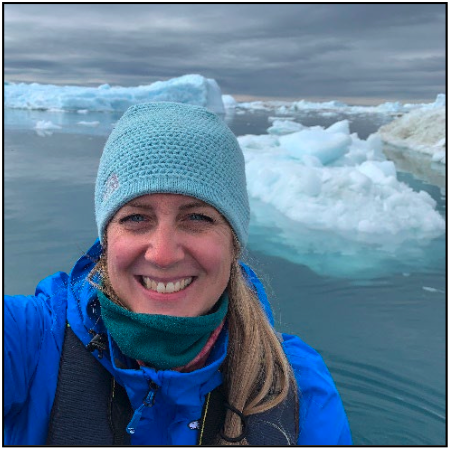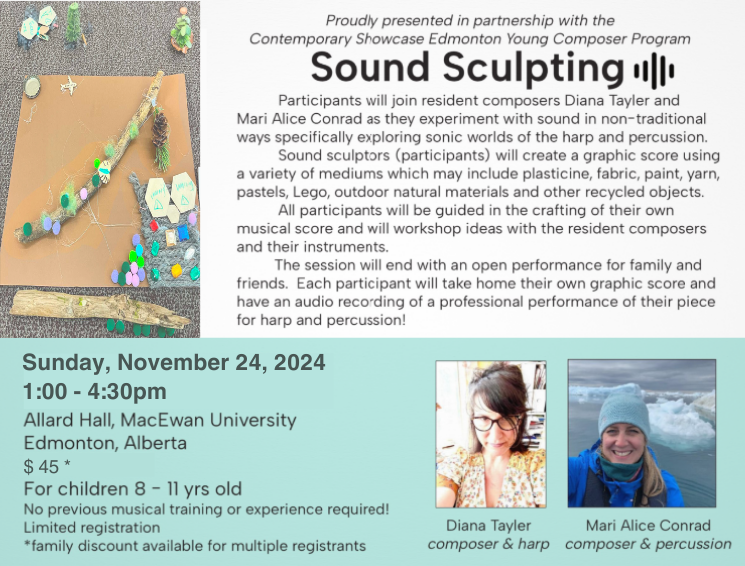2024 Sound Sculpting Workshop
Presented by Mari Alice Conrad and Diana Tayler
Participants will engage with sound in non-traditional ways specifically exploring the sound world of the harp and a collection of percussion instruments. They will create a graphic score using a variety of mediums including plasticine, fabric, paint, yarn, pastels, crayons, Lego bricks, natural materials such as leaves and pinecones, and other recycled materials. Participants will be guided in the crafting of their own score from these materials that will correspond with chosen sound instructions. Through the sculpting of sound elements in their score, the participants will have the opportunity to workshop ideas with the presenters and their instruments. The session will end with an open performance for family and friends. Each participant will receive a take-home graphic score, audio recording, and professional performance of their piece for harp and percussion.
Location: Room 11-361, Allard Hall, MacEwan University
Date: Sunday, November 24
Time: 1:00 – 4:30
Last 40 min is a performance open to family and friends
Ages: approximately 8-11
Fee: $45
Family rate: $40 per child for families with 2 or more registered.
Registration deadline: Monday, November 18
15 students maximum
Workshop outline:
- Welcome and introduction activity (10 min)
- Sound bath (deep listening) and improvisation activity (20 min)
- Graphic score exploration and study (40 min)
- Break (5 min)
- Stations: guided graphic score creation and sound workshops (55 min)
- Break/snack (participants bring their own snack) (10 min)
- Score Wrap-up, tidy and prepare for performance (30 min)
- Welcome of family and friends for performance (40 min)
 Diana Tayler is a composer, arranger, performer (harp, voice) and musical educator based on Treaty 6 Territory in Edmonton, Alberta. Diana turned to composition as a medium for her artistic expression after spending many years travelling across the country and abroad, engaging and performing with diverse musical communities in Asia and Eastern Europe.
Diana Tayler is a composer, arranger, performer (harp, voice) and musical educator based on Treaty 6 Territory in Edmonton, Alberta. Diana turned to composition as a medium for her artistic expression after spending many years travelling across the country and abroad, engaging and performing with diverse musical communities in Asia and Eastern Europe.
In her compositions, she uses extended techniques and deconstructs sound to explore resonance and tonal colour and bring the listener inside the sound worlds she creates. She has recently developed a fascination for creating acousmatic works that exist perpetually, and is drawn to the idea that with each listening of a piece it is rendered anew.
Diana has completed graduated studies in composition and linguistics at the University of Alberta, and an Associate diploma in Piano Performance from the Royal Conservatory of Music (ARCT). She is active in community music as a clinician and adjudicator, in local arts organisations, and in Edmonton’s vibrant choral community.
Her favourite dinosaur is the gentle yet powerful brontosaurus, and her favourite ice cream flavour is dill pickle peanut butter. When not writing or playing music, she can be found building tiny shelters for the gnomes and fairies that inhabit her backyard garden.
 Mari Alice Conrad is an award-winning composer currently completing graduate work in music composition at the University of Alberta. Her compositions have been performed across Canada, USA, and Europe at Ottawa Chamberfest, Vancouver’s Allegra Chamber Orchestra FestivELLE, Été musical de Barachois in New Brunswick, in the Žofín Palace for the World Wind Music Festival and WASBE Conference in Prague, Czech Republic, Toronto’s East Chamber Music Festival, the Banff Centre for the Arts EvoFest, New Music Edmonton Summer Solstice Festival, the GroundSwell Series (Manitoba), Modulus Festival (Vancouver), and the Music Concert Series (Toronto).
Mari Alice Conrad is an award-winning composer currently completing graduate work in music composition at the University of Alberta. Her compositions have been performed across Canada, USA, and Europe at Ottawa Chamberfest, Vancouver’s Allegra Chamber Orchestra FestivELLE, Été musical de Barachois in New Brunswick, in the Žofín Palace for the World Wind Music Festival and WASBE Conference in Prague, Czech Republic, Toronto’s East Chamber Music Festival, the Banff Centre for the Arts EvoFest, New Music Edmonton Summer Solstice Festival, the GroundSwell Series (Manitoba), Modulus Festival (Vancouver), and the Music Concert Series (Toronto).
She has mentored young composers with the Tuckamore Festival Widening the Circle Program (Newfoundland), Contemporary Showcase Edmonton, New Brunswick Registered Music Teachers Association Composition program and is a sessional instructor at MacEwan University in composition. Mari Alice’s current research focuses on composing accessible contemporary chamber music for developing musicians that promote inclusivity and self-expression. Her work suggests that ensemble music can be a participatory way of knowing that empowers youth to express their ideas and critically consider and engage with the world around them.
Mari Alice is often busy keeping up with her three active children who are always chasing the next adventure. Her compositional practice shines an exceptional light on the human condition and fosters curiosity, authenticity, connection, and collaboration. Several of her scores have been published and commercially recorded and can be found on her website.

